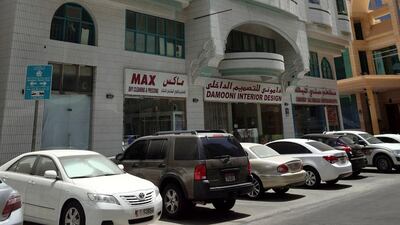It was a simple request – well, I thought so anyway. With my aunt flying in to pay me a visit at my shiny new apartment on Al Reem Island, I asked the officials at the lobby – that's what they call the ground floor of the newer buildings – about letting her up when she arrived.
“No sir,” the attendant tutted. “It’s not like this here. We call your apartment intercom and you welcome her.”
When I explained I wouldn’t be home, the man was flummoxed. What ensued were rapid conversations with his colleague, a small notebook was consulted, and finally I was handed a card with a toll-free number on it and told to lodge an official request with “headquarters”.
I was horrified and I realised this is what happens when buildings are modernised and put in the hands of corporations. While the attendants were technically correct in not granting my wish, due to security, the drama surrounding it all made me long for the days of the “natoor”.
If you don’t know what that term means, you clearly haven’t lived in some of Abu Dhabi’s older buildings. Meaning “concierge” in Arabic, the natoor in the Gulf is an institution and one of the most important people you will ever come across.
With most residing within the building, the natoor (or watchman as they are most commonly referred to) offers a broad range of services, from security and maintenance to resolving disputes with the landlord. If your natoor is decent, the building is blessed. If they are poor, they become a daily source of distrust.
Any natoor worth his salt knows the gig is much more. The natoor is often the first and last face we see each day. They subconsciously set the tone for our day with their overall vibe. Hence, positivity is the top requirement for those entering the field.
I still recall the massive grin of Yunus, the Egyptian who marshalled our old apartment on Airport Road back in the 1980s. I was nine at the time, and his height made him seem like a giant, but I always remember how gentle he was with the kids – especially the way he cheered us up as we headed for school exams.
On the weekends I would often wake early and hang out with him while he washed selected cars (for extra pocket money) following the latest sandstorm. We would talk football or he would try to describe the pyramids.
Sadly, with the increasing number of modern residential skyscrapers, old-fashioned natoors are being replaced by characterless, uniformed staff, most of them debarred from thinking for themselves.
Worried about the loss of the old-school watchmen, I ventured back to my old neighbourhood of Darat Al Miyah in Khalidiya to ask some of them how they felt about the changes.
"Times and people change," said the Bangladeshi Nour, who preferred not to give his last name. "I would never take a job with these places because you don't live in the building. They put you in the bus and take you from the camp to work, day shift and night shift. As a natoor you need to live there with the people. They need to see your face all the time."
Abdelwahab agreed. The Keral, who looks after a nearby seven-storey building, said being a natoor is as much about psychology as physical labour.
“I learn about people, you understand?” he said through his mix of English and broken Arabic. “A lot of people now, they have tension. They have too much work and they come home tired. I try to make them happy, I ask ‘how are you’ and ‘how is ‘chico’ (children). I make them more calm.”
This was what was explained to Ali before flying in from his native Mauritania to become a natoor seven months ago. “They weren’t looking for carpenters or electricians. Instead, they wanted someone who was nice and that can talk to people,” he recalls.
When asked to reflect on the most challenging aspect of the job, he says: "You can feel alone sometimes, you know what I mean? At night I could sit there and not talk to anyone and I do feel lonely and miss my family. But you probably feel that too right?"
Indeed, I do miss my loved ones, but it was often gentle natoors who took away some of the sting.
____________
Read more from Saeed:
A thank you to Tiffany Haddish from an Eritrean
The story behind a signature: One UAE resident’s tale is a sign of the times
Spring in the UAE: A time filled with regret and guilt
Abu Dhabi street cricket evokes a deluge of memories
____________


